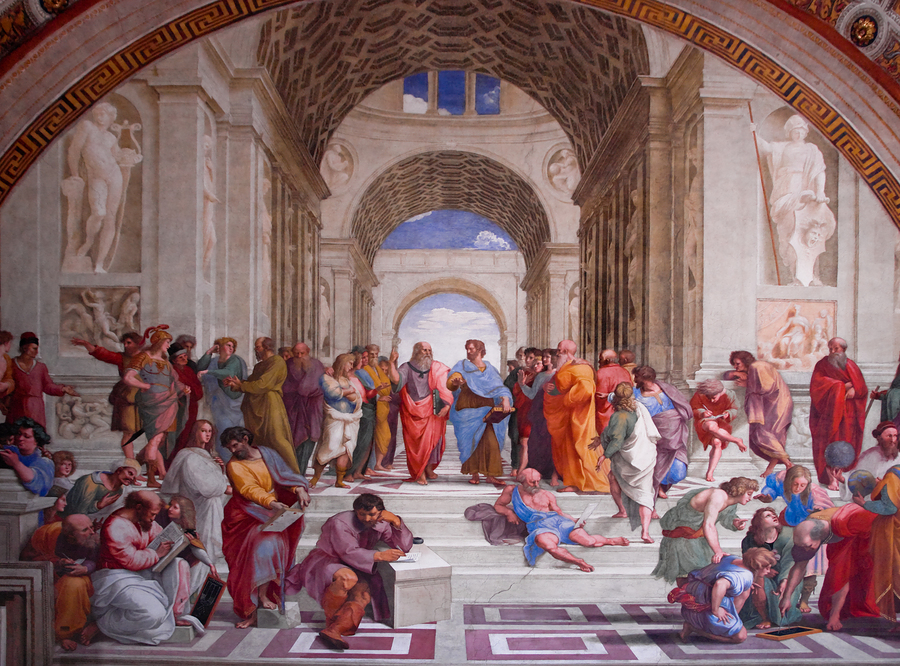When Egyptians look back on 2011, one memory that brings about plenty of lament is how individuals from across the far ends of society were once united under the clear demands for “Bread, Freedom and Social Justice,” whereas now, that unison is a thing of the past – a memory that was once sweet.
Strangely however, those demands never really changed. The question remains, why have Egyptians grown apart?
A core factor that has largely contributed to the widening gap in society is the different faces to each demand, and how one’s social class greatly impacts his/her understanding for such virtue. For instance, let’s talk about justice.
Plato tried to define justice in his most important middle dialogue, The Republic. He discussed the definition of justice, as well as the human and virtuous motives that lead us to be either just or unjust. He also described the ‘Ideal Society’, which discusses how and by whom society should be structured and ruled.
The Republic is set in Piraeus, where a group of men begin the discussion on justice, each offering a distinct interpretation.

Socrates, the main character, does not expose a real definition of justice. Rather, he underlines the fallacies in others arguments – a familiar trend which has dominated the Egyptian TV programs in the past years.
Cephalous, representing traditions or the merchant’s perspective on justice, defines justice mainly as paying back or returning what is owe. His opinion is strongly influenced by the fact that justice is strictly related to business, therefore his argument is tailored to the rules which govern markets, such as borrowing, returning, selling and buying goods. Not unfamiliar to the Egyptian society, many who belong to Egypt’s middle and lower classes are likely to adhere to such definition of justice.
Polemarchus – his son – representing the youth, agrees with Cephalous’ definition, but he adds that being just is “to do well to friends and harm enemies.”
However, in considering that friendship and justice are virtues that are rigorously interconnected, Polemarchus’ idea on justice is obfuscated by the misunderstanding of justice itself.
Resonating how youths have often mourned their deceased friends, the idea of harming an enemy in honoring a friend has oftentimes been witnessed in Egypt since 2011, and before.
In response, Socrates disagrees with Polemarchus’ definition seeing as appearances could be deceiving, and humans cannot be fully objective in deciding whether friends are good or seem to be good, and vice versa.
Consequently, Trasymachus intervenes, providing a more cynical and skeptical definition which says that “justice is the advantage of the strong.”
Prompting a deeper discussion, this definition brings to light the faultiness of rulers and how, in their honest or alleged pursuit to be just, they create certain laws that satisfy their own interests.
Justice is no more a virtue acquired with knowledge, but only a tool utilized to control masses and gain profits. To clarify, Socrates provides an example: “Do doctors cure patients for the sake of it or for the reward?”
While Trasymachus states that the doctor cures his patients for the reward, Socrates replies explaining that the doctor is driven by two different motives. The first is the intrinsic happiness and satisfaction procured by healing the patient and by being just, and the second is the awareness of a reward and a future reputation.
Glaucon and Adeimantus, Plato’s brothers, refute the fact that being just is being happy. They argue that justice is not natural and was purely created to live peacefully together, rather than contrasting each others to seek higher profits. To that Socrates replies, saying that “knowledge of justice is knowledge of the good.”
It is worthy to not that Glaucon and Adeimantus represent the poorest classes of society where justice is not the main goal, whereas securing food and surviving yet another day is the glorified, desired goal.
In order to sort out and justify the various definitions of justice, Socrates looks at justice from the perspective of each social class.
According to Socrates, every individual is predesignated to one task. Typically, a society is divided along three main groups: the craftsman, predominated by desire, the guardians, predominated by courage and strength (more spiritual and elevated from any type of physical desire) and on the top, the philosopher king, whose soul is predominated by rationality.
Both Islam and Christianity preach the same predesignated social classes. It is the Divine Providence who “takes care” of your social status. It was not just Plato telling you that “you belong to the Golden class,” it is also your religion, society, family and unfortunately yourself as well.
Socrates does not provide a definition for justice, instead he describes how a just society should be.
Justice is a virtue that provides happiness and satisfaction to the mind and only he who masters the ability of being just can be a ruler.
Among this myriad of definitions, does any fully suffice?







Comments (6)
[…] What is Justice to Egyptians? – When Egyptians look back on 2011, one memory that brings about plenty of lament is how individuals from across the far ends of society were once united under the clear demands for “Bread, Freedom and Social Justice,” whereas now, that unison is a … […]
[…] What is Justice to Egyptians? – Plato tried to define justice in his most important middle dialogue … Socrates looks at justice from the perspective of each social class. According to Socrates, every individual is predesignated to one task. Typically, a … […]